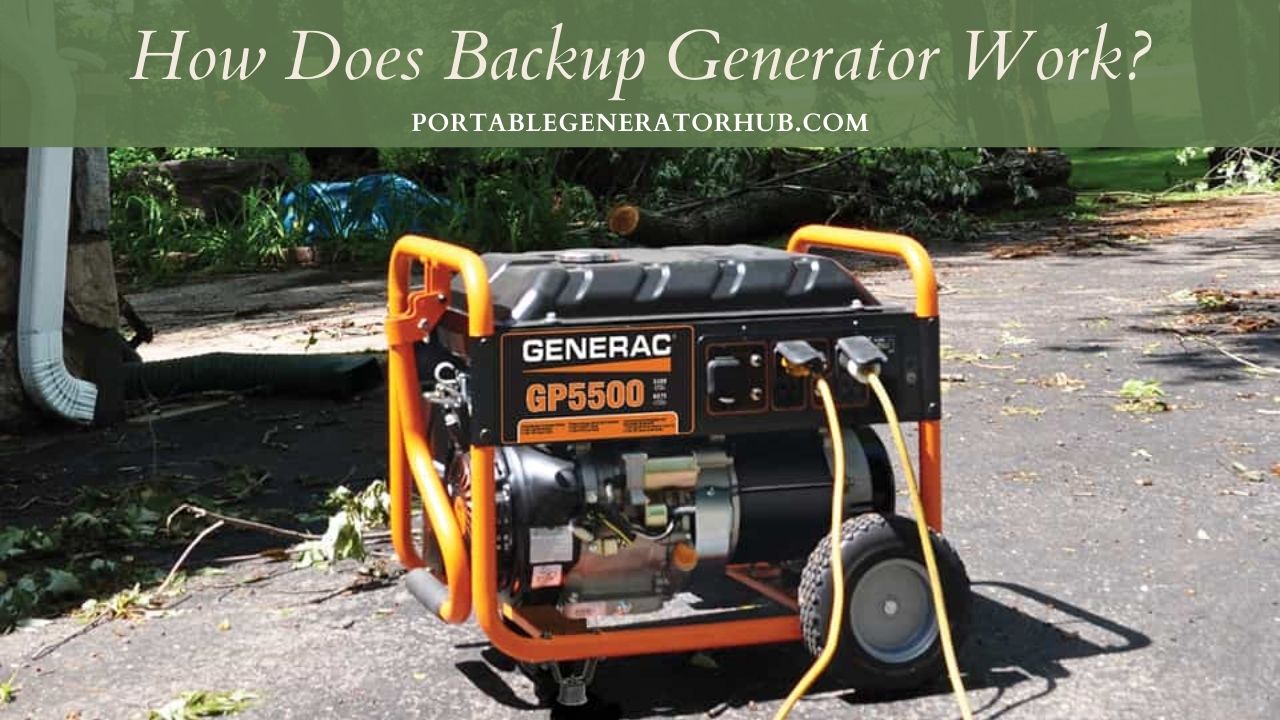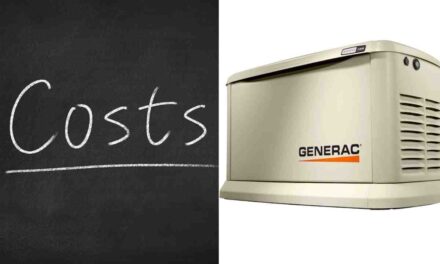
Since most of the appliances in our homes need electricity to work, it may be very difficult to live without power, even for just an hour. That’s why we need a backup generator that will kick in when the electricity from the grid ceases. This article explains how a backup generator works.
We have put the explanation in simple terms. So, causal readers can easily understand the article. In addition, we also answered a couple of frequently asked questions.
After reading the article to the end, you’ll understand how backup generators work, how much power you need for your home, and how to choose the right backup generator for your home.
How Does A Backup Generator Work?
To know how a backup generator works, you need to understand the components involved. So, here are the components that must be in place before a backup generator can work.
- A generator
- Load Center: This box supplies electricity to the whole house.
- An Automatic Transfer Switch: This switch gets power from the generator and sends it to the load center, which in turn supplies the house with power.
- Power Inlet Box: This component sends power from the generator to the automatic transfer switch.
- Power Cord: It connects the generator to the power inlet box.
Now that we have listed and explained the functions of the necessary components, let’s explain how a backup generator works. There are two types of backup generators – the automatic generator and the manual one. For the automatic generator, it starts on its own once there’s a power outage.
When there’s a power outage, the automatic transfer switch sends a signal to the generator, and it starts automatically. The process takes place within a second. To ensure that it’s always in good condition, this type of generator does a self-diagnostic test once a week. It’ll run for 20 minutes.
For the manual backup generator, you’ll need to start it up manually either using electric start or through recoil start. For convenience, the former is a better choice, but in a situation where your generator cannot power all your appliances, the latter is a better choice. You’ll turn off some appliances before starting it up.
Once the generator begins to work, it turns mechanical energy into electricity and sends it straight to the power inlet box. The power inlet box then sends it to the transfer switch. The transfer switch can then send it to the load center that supplies your home with power.
When the grid power is restored, the automatic transfer switch will sense that there’s power in the load center. It will stop transmitting power.
If your generator is an automatic backup generator, the transfer switch will send a signal to it, triggering a shutdown. If your generator isn’t an automatic generator, you have to go and switch it off manually.
How Much Backup Generator Power Do I Need?
The answer to this question depends on the number of electrical appliances you want to power and your total power consumption. You need to find out the wattage of each of the appliances and total them up. That will give you your total power consumption. Whatever figure you arrive at is the backup generator power you need.
However, a 22KW generator should be able to power your home fully. That’s why many people go for that option. Remember, the higher the power output of your generator, the higher its cost.
If your power consumption is not up to 22KW, installing a 22KW generator will be a waste of money. So, we will advise you to buy only a generator that can take care of your exact power consumption.
Which Backup Generator is Best For A Home?
To choose a generator for your home, you must consider some important features. Any generator that has all the features will be a good choice for your home.
High power output – You don’t want to buy a generator that cannot power all the appliances in your home. In fact, it is not a good idea to turn off some appliances before you start your generator.
That’s why you need a generator that has a high output. Consider an output of at least 7.5KW. Don’t go for any generator that offers less.
Low noise level – You should also consider a generator whose noise level is low. If your generator is too noisy, it will not only disturb you, and it will constitute a nuisance in your whole neighborhood. Low noise should be at the top of your priority.
Low fuel consumption – You also need to consider low fuel consumption. You need a generator with a high fuel conservation rate. We don’t want you to spend a large chunk of your earnings on fueling your generator.
Its Amazon rating should be high – For assurance, you need to check the Amazon rating of your generator. Good generators usually have a high Amazon rating.
Based on the factors discussed above, here are some generators that you can consider. They meet the requirements listed above.
- Generac 7043 Home Standby Generator
- Champion 8.5-kW Standby Generator
- Generac 6551 Guardian Series
- Rainier R12000DF
- Generac 5734 GP15000E
- GENERAC RG02224GNAX – 22/22 kW
What Does a Backup Generator Run On?
Most backup generators run on liquid propane gas, natural gas, or diesel. With the ones that run on diesel, you’ll need to refuel them, depending on how often you use them. On the other, the ones that run on either natural gas do not need refueling as they will tap into the gas supply to your home.
Many of them are installed with an automatic transfer switch, so they are able to start immediately after a power outage occurs. Once there is a power failure, the transfer switch will send a signal to the backup generator and it will start in a matter of seconds.
This arrangement is important for elevators in high-rise buildings because someone may be trapped in an elevator during a power outage. Medical and life support equipment also need a standby backup generator.
How to Use a Backup Generator for Home
You can install it with a manual transfer switch or an automatic transfer switch. The latter is more expensive but it offers convenience.
1. With a manual transfer switch
Step 1 – When there is a power outage, the first thing to do is to check the engine oil level.
Step 2- Start your generator.
Step 3 – Go to the manual switch and flip it to the generator’s side if you want the generator to power all your appliances. If the generator is not big enough to power all your equipment, you need to turn off all the appliances you don’t want to power before you flip the switch to the generator’s side.
Step 4 – When the power is restored, you’ll flip the transfer switch back to the grid’s side and turn on the appliances you turned off.
Step 5 – Shut down the generator.
2. With an automatic transfer switch
There’s really nothing to do since the transfer switch does most of the work. When there’s a power outage, the automatic transfer switch will start the generator automatically. And when the power is restored, it will also shut down the generator automatically.
The most important thing is to follow the manufacturer’s maintenance instructions to the letter. When the generator is due for maintenance checks, don’t skip it. When you take proper care of your generator, you’ll not only get optimum performance all the time, but you will also extend its lifespan.
How Long Can You Run a Backup Generator?
This is a very tricky question and it requires a detailed explanation. Of course, backup generators can run for about 500 – 3,000 straight hours. But there are several other factors to consider. One of them is the type of fuel. Most generators do not have enough fuel tanks to last for 500 hours.
And once the generator runs out of fuel, it will shut down. You’ll have to refuel it before you start it again. Secondly, if the generator runs on natural gas, you don’t need to refuel it, but in the event of a natural disaster, the gas supply will be shut down to prevent fire hazards. And if you no longer have any gas supply, how would you power your backup generator?
Another factor is the lifespan of the generator. Heavy usage quickens wear and tear and shortens the lifespan of generators. So, it is advised to allow your generator to rest after a certain number of hours. For the purpose of the question, we’ll answer that a backup generator can run for 500 – 3,000 hours, but this is almost not feasible, considering the factors mentioned above.
Is It Worth Getting a Backup Generator?
Yes, of course, a backup generator is a worthy investment for the reasons mentioned below. For high-rise buildings that comprise more than 15 floors, an elevator is necessary. But elevators are electrically powered. What happens if a power occurs while some people are in the elevator? Without a backup generator, the people trapped in the elevator could die of suffocation if the outage goes on for some hours.
If you run a medical facility, there must be a backup generator attached to the facility because medical equipment is usually electrically powered. Also, if you use powerful equipment for your work, you’ll need a generator, or you’ll begin to lose money during a power outage.
Now let’s talk about homes. During a power outage, you won’t be able to use your phone, laptop, cooling unit, heating unit, dishwasher, or even washing machine. In the worst case, all the vegetables, fruits, groceries, and other items in your refrigerator or freezer may all perish.
You don’t even want to imagine a power outage during the cold days of winter. No heating unit will heat your apartment. Based on the points raised above, it is clear that a backup generator is a worthy investment. We advise you to purchase one. Yes, a generator is expensive, but it is not as expensive as a power outage.
Final Word
Once again, here is a quick summary of how a generator works. It turns mechanical energy into electrical energy (electricity) before sending it to the power inlet box, which then sends the electricity to the automatic transfer switch. The transfer switch sends it to the load center, where it is supplied to your home.
The generator power you need depends on the total power consumption in your home. You can determine it. Finally, the best generators for homes have been listed above. You’ll be good with any of them.






